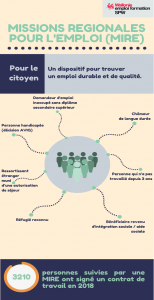2. Disadvantaged workers and policies targeting them including WISEs

The Walloon Region defines the category of “Disadvantaged Workers” in the decree of 20 October 2016 concerning the agreement on social economy initiatives and the agreement on the subsidization of WISEs. To be recognized as a disadvantaged worker, there are two mandatory conditions. Furthermore at least one additional condition should be applicable to your situation (Belgium. Wallonia 2016a).
Mandatory conditions:
- Not to have an upper secondary educational or vocational qualification
- To be registered as an unoccupied job seeker
Additional conditions:
- To receive an unemployment fee, social integration fee, or no income for at least 6 months
- To be between 18 and 24 years old
- To be over 50 years old
- To be a single parent
- To be part of the under-represented sex in a specific sector
- To be a member of an ethnic minority within a Member State and to be in need of language training
- To be recognised as having a disability requiring assistance for training or employment (Belgium. Wallonia 1995):
In Wallonia, the Decree on the Integration of Persons with Disabilities of 1995 defines as disabled anyone with a significant limitation of his or her capacities considering social or professional integration as a result of an alteration of his or her mental, sensory or physical capacities, which leads to the need for social intervention.
Being recognized as a person with a disability gives access to various supporting measures. In Wallonia, this regulation is the competence of the General Direction of Persons with Disabilities (Federal Public Service – Social Security). This recognition, investigated case by case, is based on a medical assessment of the physical and/or mental consequences of the disability on the individual’s autonomy.
- To receive a (temporary) salary (equal to the unemployment fee) from the CPAS (Public Centre for Social Action) instead of a social allocation, while gaining experience on the labour market (specific statute: Art. 60).
- Labour policies to increase employment opportunities for disadvantaged workers
Compensation policies compensating enterprises for the lower productivity of the Supported employment – mix of policies that intervene directly – e.g. support the selection and training costs of enterprises integrating disadvantaged persons to work disadvantaged workers employed – e.g. for the hiring and training costs involved.
| Typology of compensation measure | Targeted beneficiaries* | Describe the compensation measure
(refer to the relevant regulation) | Amount of each compensation measure |
| Incentives for recruitment of disadvantaged persons | Person unemployed for more than 12 months | “Impulsion 12”: Financial support from the Walloon Region during 2 years. The employer pays its worker his salary minus the amount directly given by the Walloon Region to the worker. | 500 EUR for the first 12 months, 250 EUR from the 13th to 18th month and 125 EUR from the 19th to the 24th month. |
| Unemployed, low-skilled job seeker under the age of 25 | Financial support from the Walloon Region during 3 years. The employer can deduct from the young worker’s salary a bonus that the Walloon Region pays directly to the worker. | 500 EUR for the first 24 months, 250 EUR from the 25th to the 30th month, and 125 EUR from the 31st to the 36th month. | |
| People aged over 55 receiving a gross quarterly salary of < 14,505 EUR | “Impulsion 55”: The employer is entitled to a reduction of the social security contributions until the employee reaches the age of retirement. | The reduction per trimester amounts to: 400 EUR for persons between 55 and 57 years old, 1,000 EUR for persons between 58 and 61 years old, 1,500 EUR for persons over 62 years old. | |
| People with a disability | The employer is entitled to an integration bonus that reimburses part of the salary if the employee returns after absence due to sickness or if he/she was inactive for 6 months in the previous 9 months. | 25% of the salary cost for one year | |
| Funding for training and guidance before recruitment | People with a disability | The employer can receive a tutoring bonus if the enterprise hires a tutor to accompany and guide the recently hired disabled worker. | 1,500 EUR |
| Funding for the adjustment of the workplace to better suit the needs of disadvantaged workers | People with a disability | The employer can receive a compensation bonus covering part of the costs for adjusting the work place when employing a worker with a disability. | 45% of the costs |
| Financial coverage of paid internships for disadvantaged workers | n/a | n/a | n/a |
| Other measures | People with a disability | Independent workers with a disability can receive a compensation that supports or helps retain their professional activity | 33% of the monthly minimum income during 1 year |
In Wallonia, the following organisations disseminate the philosophy of supported employment Regional Employment Missions and AVIQ.
Regional Employment Missions
Regional Employment Missions are organisations that offer specific support for people with a serious distance to the labour market.

MIRE
Objective of the Regional Missions for Employment (MIRE) for the citizen: find a sustainable and quality job
Who can benefit from the services of a MIRE?
- the unemployed job seeker without an upper secondary diploma
- the long-term unemployed
- the disabled person (AVIQ decision)
- the person who has not worked for 3 years
- the foreign national with a residence permit
- recognized refugee
- the beneficiary of social integration income / social assistance.
What are the advantages?
- support before and during employment (2 years maximum)
- an employment contract for a total duration of at least 6 months
- a job related to your professional project
Five-step support:
- welcome
- personal project
- individual follow-up and alternating training
- employment contract
- post-engagement follow-up
MIRE must be approved
A Regional Employment Mission obtains approval for a renewable period of three years.
What are the conditions for being approved as a Regional Mission?
- Be incorporated in one of the forms referred to by the law of June 27, 1921 on non-profit associations;
- Have entered into a partnership agreement with Forem;
- Adopt statutes in accordance with art. 4 §1, 4° of the decree of March 11, 2004 relating to the approval and subsidization of regional employment missions;
- Undertake to conclude with the beneficiary an agreement guaranteeing the beneficiary reception, psychosocial support, individualized assessment, etc.;
- Undertake to enter into an employment agreement with the employer;
- Commit to supporting beneficiaries after their professional integration;
- Develop an integrated and concerted three-year local plan;
- Develop an annual action plan;
- Support a minimum number of beneficiaries per full-time equivalent.
MIRE also helps employers. Both employers in the private sector and those in the public or non-profit sectors can collaborate with a Regional Employment Mission to recruit staff.
Subsidies granted to MIRE
Approved Regional Employment Missions benefit from a grant made up of:
- an annual subsidy for the salary and operating costs of the first three workers;
- a capped annual operating subsidy;
- a subsidy paid by Forem;
- an additional grant linked to the performance of the regional mission;
- a subsidy linked to the non-market agreements.
As an interface between the employer and the job seeker, the MIRE will be responsible for identifying at each stage of the integration process any obstacles encountered and will be responsible for implementing actions aimed at strengthening their skills.

What a typical MIRE is and does
- mission is to match job supply and demand through completely free services for job seekers and businesses with the objective is to promote the long-term integration of the worker within the company.
MIRE services
For job seekers – individual jobcoaching service or alternating training accompanied by an internship in a company.
For employers – organize adjustment sequences specific to your profession or help with recruitment.
For workers in the non-profit sector – professional development tools eg Skills Assessments
AVIQ is the Walloon Agency for Quality of Life, they work with training contracts.
Quota systems that oblige all or some enterprises to hire a minimum percentage of disadvantaged workers.
The Federal Royal Decree of March 2007 concerning the recruitment of persons with disabilities states that a quota of 3 % of all federal employees should be persons with disabilities in all federal departments. A recent evaluation of this policy plan for the Flemish speaking part of Belgium shows that at the end of 2018, 678 registered persons (1.8 %) with a disability or chronic illness were employed within the Flemish administration (compared to 585 at the end of 2017).
The Walloon Civil Service Code currently sets the employment quota for people with disabilities at 2.5% of the workforce on 31 December of the previous year. As long as this percentage is not reached, 5% of new recruitments are reserved for people with disabilities. This measure applies to the services of the Walloon Government and to public interest bodies whose staff is subject to the status of civil servants of the Region. Similar provisions exist for local governments and public services. Recruitment is organized by SELOR. This body deals with recruitment in the public services.
In Wallonia, there are only quota for public companies. The law requires one part-time employee with a disability for every 20 full time employees (Belgium. Wallonia 2007). Employers must comply with an employment rate of 6% of disabled persons. Whether this is not respected, thanks to a law dated on 11 February 2005, employers must pay a contribution to the Association Managing funding for Integration of Disabled Persons (“Association de Gestion du Fonds pour l’Insertion des Personnes Handicapées, AGEFIPH) for the private sector or to the Fund for Integration of Disabled Persons in the Public Sector (Fonds pour l’Insertion des Personnes Handicapées dans la Fonction Publique, FIPHFP) for the public sector.
Supported employment
SUEM is the Belgian association for Supported Employment that promotes and supports the vision on Supported Employment. They work according to the European manual on Supported Employment (SUEM 2021).
Supported employment is a process in 5 phases:
- Customer engagement
- Vocational profiling
- Job finding
- Employer involvement
- Support on and off the job
This trajectory has to support the job seeker and the employer before, during and after the job search.
- It’s a paid trajectory.
- It’s an inclusive trajectory on the regular labour market.
- There’s a continuous support of the employee and the employer during the trajectory.

